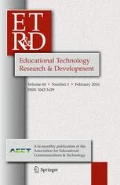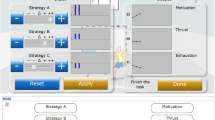Abstract
Complex Problem Solving (CPS) skills are essential to successfully deal with environments that change dynamically and involve a large number of interconnected and partially unknown causal influences. The increasing importance of such skills in the 21st century requires appropriate assessment and intervention methods, which in turn rely on adequate item construction, delivery, and scoring. The lack of assessment tools, however, has slowed down research on and understanding of CPS. This paper first presents the MicroDYN framework for assessing CPS, which is based on linear structural equation systems with input and output variables and opaque relations among them. Second, a versatile assessment platform, the CBA Item Builder, which allows the authoring, delivery, and scoring of CPS tasks for scientific and educational purposes is introduced. Third, we demonstrate the potential of such a tool for research by reporting an experimental study illustrating the effect of domain specific content knowledge on performance in CPS tasks both on an overall performance and on a process level. The importance of accessible and versatile technical platforms not only for assessment and research but also for intervention and learning are discussed with a particular focus on educational contexts.



Similar content being viewed by others
References
Abele, S., Greiff, S., Gschwendtner, T., Wüstenberg, S., Nickolaus, R., Nitschke, A., et al. (2012). Die Bedeutung übergreifender kognitiver Determinanten für die Bewältigung beruflicher Anforderungen. Untersuchung am Beispiel dynamischen und technischen Problemlösens [The importance of general cognitive determinants in mastering job demands. Some research on the example of dynamic and technical problem solving]. Zeitschrift für Erziehungswissenschaft, 15, 363–391.
Autor, D., & Dorn, D. (2009). This job is “Getting Old”: Measuring changes in job opportunities using occupational age structure. American Economic Review, 99, 45–51.
Autor, D. H., Levy, F., & Murnane, R. J. (2003). The skill content of recent technological change: An empirical exploration. Quarterly Journal of Economics, 118, 1279–1333.
Buchner, A. (1995). Basic topics and approaches to the study of complex problem solving. In P. A. Frensch & J. Funke (Eds.), Complex problem solving: The European perspective (pp. 27–63). Hillsdale, NJ: Erlbaum.
Bunderson, C. V., Inouye, D. K., & Olsen, J. B. (1989). The four generations of computerized educational measurement. In R. L. Linn (Ed.), Educational Measurement (pp. 367–407). New York, NY: Macmillan Publishing.
Chen, Z., & Klahr, D. (1999). All other things being equal: Acquisition and transfer of the Control of Variables Strategy. Child Development, 70, 1098–1120.
Danner, D., Hagemann, D., Holt, D. V., Hager, M., Schankin, A., Wüstenberg, S., et al. (2011). Measuring performance in a complex problem solving task: Reliability and validity of the Tailorshop simulation. Journal of Individual Differences, 32, 225–233.
Dörner, D. (1986). Diagnostik der operativen Intelligenz [Assessment of operative intelligence]. Diagnostica, 32(4), 290–308.
Fischer, A., Greiff, S., & Funke, J. (2012). The process of solving complex problems. Journal of Problem Solving, 4(1), 19–42.
Frensch, P. A., & Funke, J. (Eds.). (1995). Complex problem solving: The European perspective. Hillsdale, NJ: Lawrence Erlbaum Associates.
Funke, J. (1992). Dealing with dynamic systems: Research strategy, diagnostic approach and experimental results. German Journal of Psychology, 16, 24–43.
Funke, J. (2001). Dynamic systems as tools for analysing human judgement. Thinking and Reasoning, 7(1), 69–89.
Funke, J. (2003). Problemlösendes Denken [Problem solving]. Stuttgart: Kohlhammer.
Funke, J. (2010). Complex problem solving: A case for complex cognition? Cognitive Processing, 11(2), 133–142.
Fyfe, E. R., Rittle-Johnson, B., & DeCaro, M. S. (2012). The effects of feedback during exploratory mathematics problem solving: Prior knowledge matters. Journal of Educational Psychology, 104, 1094–1108.
Gonzalez, C., Thomas, R. P., & Vanyukov, P. (2005). The relationships between cognitive ability and dynamic decision making. Intelligence, 33(2), 169–186.
Graesser, A. C., Jeon, M., & Dufty, D. (2008). Agent technologies designed to facilitate interactive knowledge construction. Discourse Processes, 45, 298–322.
Greiff, S., & Fischer, A. (2013). Der Nutzen einer Komplexen Problemlösekompetenz: Theoretische Überlegungen und empirische Befunde [Usefulness of Complex Problem Solving competency: Theoretical considerations and empirical results]. Zeitschrift für Pädagogische Psychologie, 27(1), 1–13.
Greiff, S., Wüstenberg, S., & Funke, J. (2012). Dynamic Problem Solving: A new measurement perspective. Applied Psychological Measurement, 36, 189–213.
Greiff, S., Wüstenberg, S., Molnar, G., Fischer, A., Funke, J., & Csapo, B. (in press). Complex Problem Solving in educational settings—something beyond g: Concept, assessment, measurement invariance, and construct validity. Journal of Educational Psychology. doi:10.1037/a0031856.
Holyoak, K. J. (1985). The pragmatics of analogical transfer. In G. H. Bower (Ed.), The psychology of learning and motivation (pp. 59–87). New York, NJ: Academic Press.
Kalyuga, S. (2009). Knowledge elaboration: A cognitive load perspective. Learning and Instruction, 19, 402–410.
Klahr, D. (2000). Exploring science: The cognition and development of discovery processes. Cambridge, MA: MIT Press.
Kluge, A. (2008). Performance assessment with microworlds and their difficulty. Applied Psychological Measurement, 32(2), 156–180.
Kröner, S., Plass, J. L., & Leutner, D. (2005). Intelligence assessment with computer simulations. Intelligence, 33, 347–368.
Kyllonen, P. C. (2009). New constructs, methods, and directions for computer-based assessment. In F. Scheuermann & J. Björnsson (Eds.), The transition to computer-based assessment (pp. 151–156). Luxembourg: Office for Official Publications of the European Communities.
Leutner, D. (2002). The fuzzy relationship of intelligence and problem solving in computer simulations. Computers in Human Behavior, 18, 685–697.
Mayer, R. E. (2003). Learning and instruction. Upper Saddle River, NJ: Prentice Hall.
Mayer, R. E., & Wittrock, M. C. (2006). Problem solving. In P. A. Alexander & P. H. Winne (Eds.), Handbook of educational psychology (pp. 287–303). Mahwah, NJ: Lawrence Erlbaum.
Novick, L. R., & Bassok, M. (2005). Problem solving. In K. J. Holyoak & R. G. Morrison (Eds.), The Cambridge handbook of thinking and reasoning (pp. 321–349). Cambridge, NY: University Press.
OECD (2010). PISA 2012 field trial problem solving framework. Accessed at: http://www.oecd.org/dataoecd/8/42/46962005.pdf.
OECD (2012). Better skills, better jobs, better lives. Highlights of the OECD skills strategy. Accessed at: http://www.oecd-ilibrary.org/docserver/download/fulltext/9112165e5.pdf.
Perkins, D. N., & Salomon, G. (1989). Are cognitive skills context-bound? Educational Researcher, 18(10), 16–25.
Raven, J. (2000). Psychometrics, cognitive ability, and occupational performance. Review of Psychology, 7, 51–74.
Rölke, H. (2012). The item builder: A graphical authoring system for complex item development. in Proceedings of World Conference on E-Learning in Corporate, Government, Healthcare, and Higher Education (pp. 344–353). Chesapeake, VA: AACE.
Scheuermann, F., & Björnsson, J. (2009). The transition to computer-based assessment. Luxembourg: Office for Official Publications of the European Communities.
Smith, M. C., & Reio, T. G. (2006). Adult development, schooling, and the transition to work. In P. A. Alexander & P. H. Winne (Eds.), Handbook of educational psychology (pp. 115–138). Mahwah, NJ: Lawrence Erlbaum.
Spitz-Oener, A. (2006). Technical change, job tasks, and rising educational demands: Looking outside the wage structure. Journal of Labor Economics, 24(2), 235–270.
Sternberg, R. J. (1995). Expertise in complex problem solving: A comparison of alternative concepts. In P. A. Frensch & J. Funke (Eds.), Complex problem solving. The European perspective (pp. 295–321). Hillsdale, NJ: Lawrence Erlbaum.
Süß, H.-M. (1996). Intelligenz, Wissen und Problemlösen. Göttingen: Hogrefe.
Triona, L. M., & Klahr, D. (2003). Point and click or grab and heft: Comparing the influence of physical and virtual instructional materials on elementary school students’ ability to design experiments. Cognition and Instruction, 21, 149–173.
Tschirgi, J. E. (1980). Sensible reasoning: A hypothesis about hypotheses. Child Development, 51, 1–10.
Vollmeyer, R., Burns, B. D., & Holyoak, K. J. (1996). The impact of goal specificity on strategy use and the acquisition of problem structure. Cognitive Science, 20, 75–100.
Williamson, D. M., Bejar, I. I., & Mislevy, R. J. (2006). Automated scoring of complex tasks in computer-based testing: An introduction. Mahwah, NJ: Lawrence Erlbaum.
Wirth, J., & Klieme, E. (2003). Computer-based assessment of problem solving competence. Assessment in Education: Principles, Policy & Practice, 10(3), 329–345.
Wittmann, W. W., & Süß, H. M. (1999). Investigating the paths between working memory, intelligence, knowledge and complex problem solving: Performances via Brunswik-symmetry. In P. L. Ackermann, P. C. Kyllonen, & R. D. Roberts (Eds.), Learning and individual differences: Process, trait and content (pp. 77–108). Washington, DC: American Psychological Association.
Wüstenberg, S., Greiff, S., & Funke, J. (2012). Complex problem solving. More than reasoning? Intelligence, 40, 1–14.
Acknowledgments
This research was funded by a Grant of the German Research Foundation (DFG Fu 173/14-2), by the European Union (290683; LLLight'in'Europe), and by the German Federal Ministry of Education and Research (LSA004). We are grateful to the TBA group at DIPF (http://tba.dipf.de) for providing the authoring tool CBA Item Builder and technical support.
Author information
Authors and Affiliations
Corresponding author
Rights and permissions
About this article
Cite this article
Greiff, S., Wüstenberg, S., Holt, D.V. et al. Computer-based assessment of Complex Problem Solving: concept, implementation, and application. Education Tech Research Dev 61, 407–421 (2013). https://doi.org/10.1007/s11423-013-9301-x
Published:
Issue Date:
DOI: https://doi.org/10.1007/s11423-013-9301-x




